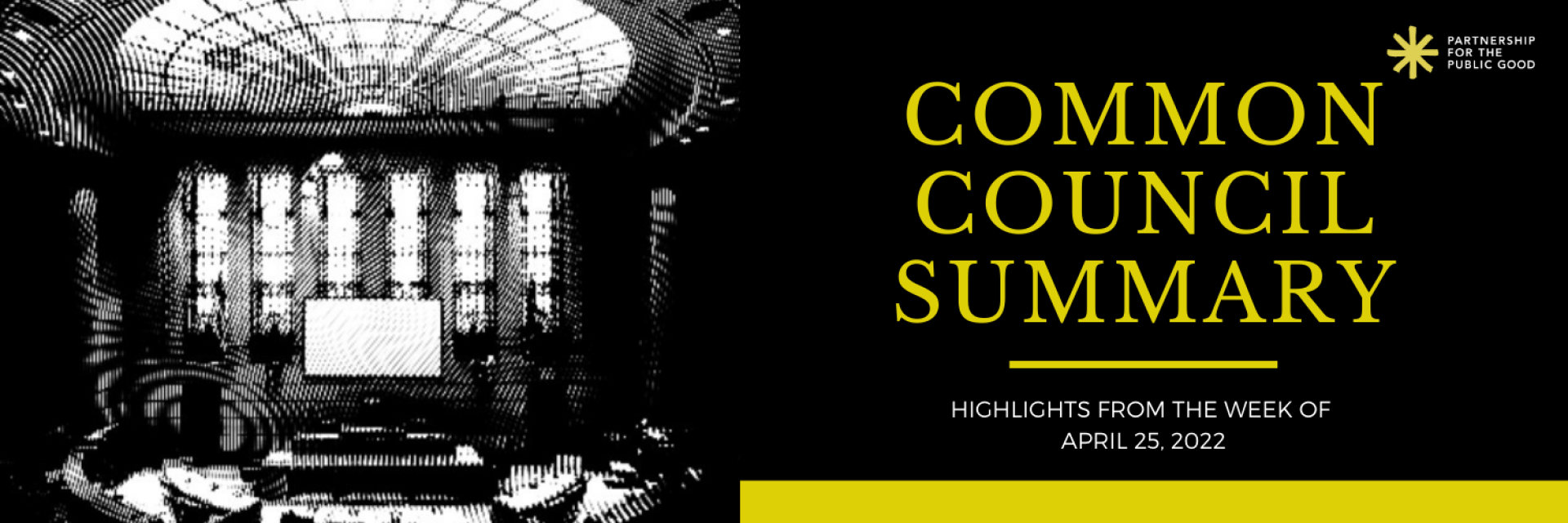News Take Action

Buffalo Common Council Summary: Week of April 25, 2022
| Date: | April 29, 2022 |
| Share: |
By Johnny Qiu, Elizabeth Quinlan, and Becca Bass|
Each week, PPG summarizes important takeaways from the major Buffalo Common Council meetings. We also include information from Council meetings related to our Community Agenda items.
This week's summary focuses on the Community Development Committee, the Legislation Committee, and the Finance Committee. The Community Development Committee focuses on matters pertaining to work or improvement using revenue from another government unit. The Finance Committee concerns all matters about the budget and issuance of bonds. The Legislation Committee focuses on local laws, ordinances, and general legislation—except for civil matters.
The Community Development Committee Meeting lasted less than two minutes. During the meeting, the committee tabled a majority of their agenda items and received and filed an item regarding violations of the apprenticeship laws. The committee moved expeditiously to adjourn.
During the Legislation Committee Meeting, council members discussed a variety of proposed business licenses. Council Member Wyatt voiced his opposition to a request for a short-term rental permit at 209 Comstock. "It is not going to happen because this person has not worked with the community." Wyatt explained that he spoke to block club members and collected 911 call records to document his point.
The committee also held several public hearings. A Buffalo couple presented plans to remodel and use their property at 431 Hoyt as short-term housing for travel nurses. Council Member Rivera said he would like to stop by to look at the property. The owner of 101 Grant wants a special use permit for an indoor smoke and hookah lounge. She promised that although the lounge would sell hookah and tobacco, smoking would not be permitted inside or outside the building. The owners of 209 Niagara Street also want a special use permit to sell tobacco and smoke products. Council Member Nowakowski approved the permit on the condition that no products are on display neighbors can see when they walk by the store.
During the public hearing for the non-owner-occupied, short-term rental permit at 180 Norwalk, there was a short debate over the approval of Airbnb space. One resident in attendance shared her concerns regarding neighborhood stability in an otherwise quiet, residential area. After purchasing the property in 2017 and renovating it, the property owners promised that they would not let "just anyone" stay there. Instead, long-term residents, both doctors, will live on the first floor, and short-term renters will rent upstairs. Requirements include a minimum stay of two nights and a maximum of five guests. Council Member Feroleto recommended one-year approval to see if there "are issues" that need addressing.
The primary topics of conversation at this week's Finance Committee Meeting included an update on the status of the City of Buffalo's interfund loans and a review of the S&P Global rating of Buffalo's credit for 2022. The City uses interfund loans to launch public work projects when projects are selected for state and federal grants but before the distribution of grant money. State and federal grants often don't release funds to projects until several months into the proposed project timelines, so the interfund loans—drawn from the City's general fund—provide cash advances to get projects started. Buffalo currently has $18 million set aside for interfund loans, $17.7 million already dispersed. There are 35 projects currently funded through interfund loans, and they are all on repayment plans.
The S&P, a global credit rating agency, upgraded Buffalo from "negative" to "stable" for 2022 and awarded an A+ credit rating on general debt obligations. This improved credit rating will allow Buffalo to borrow with lower interest rates, saving the City money. The report also acknowledged concerns when the federal influx of COVID-related emergency funding and increased sales tax revenues related to federal stimulus checks dry up, the City does not currently have systems to generate enough revenue to support recurring expenses. Committee members discussed the need to begin to look at raising tax levies—property taxes, user fees, water fees—to generate additional revenue that won't dramatically and abruptly increase costs for residents.
Need more than just a summary? Contact us at info@ppgbuffalo.org, or find full meeting information and schedules here: http://buffalony.iqm2.com/Citizens/Default.aspx